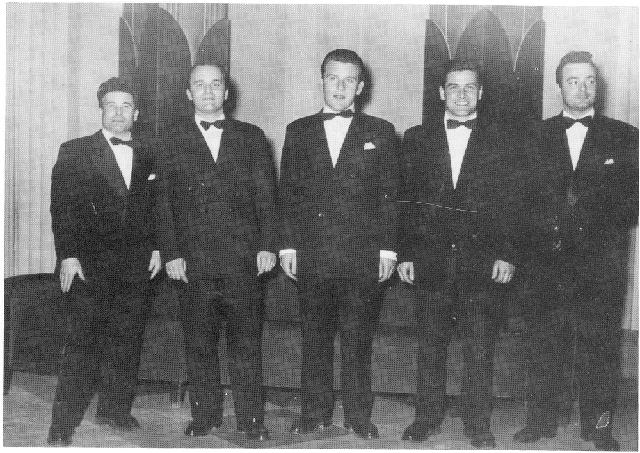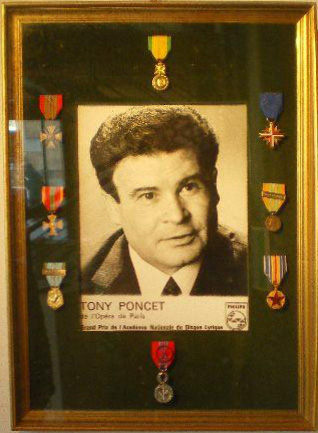Tony Poncet's biography and repertoryWhen France declared war on Nazi Germany in fall 1939, Antoine Poncé volunteered for the French army, albeit still a Spanish subject (he enrolled with a foreigners' battalion). When Germany attacked in May 1940, he was immediately sent to the front; he distinguished himself by destroying a panzer with a grenade, and survived the horrible "Bataille de France" (six weeks, minimum 60000 dead French soldiers, a Nazi triumph). He was wounded, though, and made prisoner of war by the Germans. He had to do forced labor in German agriculture for four-and-a-half years; twice, he attempted to escape, and so he was sent to the infamous camp at Rava-Ruska (Ukraine), which was especially for French and Belgian prisoners whose flight plans had been frustrated, and offered atrocious living (and dying) conditions. Poncé survived again and was brought back to Germany when the Nazis lost the war on the Eastern front against the Soviets. He was liberated by US troops in early 1945, and immediately joined the US army as a volunteer, fighting the rest of the war and becoming one of the liberators of the Dachau concentration camp. He received several military decorations, most of them French (including the Médaille militaire, the highest French decoration for plain soldiers), one US-American (the Medal for Merit, the highest US decoration for civilians during World War II).
DETAIL DES DECORATIONS DE TONY PONCET RECUES A TITRE MILITAIRE Haut centre : Médaille militaire A gauche de haut en bas : Croix de guerre 39-45 avec étoile d'argent Croix du combattant volontaire Médaille commémorative de la Guerre 1939-1945 A droite de haut en bas Croix du combattant de l'Europe Médaille des engagés volontaires Médaille des blessés de guerre Bas centre : Medal for Merit, USABack to Bagnères-de-Bigorre, Poncé hired himself out as a construction worker, and eventually became a French citizen in 1947. He still loved singing, and at age 28 decided to go to Paris to study at the conservatory, although his family could not and didn't even want to support him. He was accepted both to the conservatory (he was actually too old for it, but exceptions were made for post-war soldiers at the time) and into the choir of the Gaîté-Lyrique, where he sang for four years. However, choir work was so ill-paid that he had to share a room with another singer, and often worked late night shifts at Les Halles, the famous Paris market, where he would unload foodstuffs. Poncé made his debut in January 1953 in Lyon in concert, and his stage debut the same month in Avignon as both Turiddu and Canio. The long rest of the year, he was not exactly busy: another Canio at the Capitole in Toulouse, a few performances back home in Bagnères-de-Bigorre: he must have had some bread-and-butter job besides that, but we don't know which one.
 In 1954, he won the first prize in the fort-ténor category at an amazing tenors-only competition in Cannes. (Amazing because the other prize winners that same year were Alain Vanzo, Gustave Botiaux, Guy Chauvet and Roger Gardes – quite an impressive output.) Nonetheless, his career failed to take off; his stature (he was just 1.58 meters "tall", or 5.2 feet) may have been an obstacle. A sports manager organized a long tour of the USA, Canada and Mexico for him, but it was a big disappointment since the promises made were not fulfilled, and instead of important concert halls and opera houses, he sang in small towns and night clubs, and payment was scarce. On that tour, he changed his name to Tony Poncet. He returned to France in June 1956, and finally succeeded to audition with Georges Hirsch, the manager of both the Paris Opéra and the Opéra-Comique. As a result, Poncet made his Opéra-Comique debut as in January 1957, and his Opéra debut as Italienischer Sänger in April: roles for which his short stature was no obstacle. He was a big success; many Pagliacci performances at the Opéra-Comique followed, and he also got to sing Rodolfo. In Toulon, he sang his first Don José, and he made his first records: his huge voice, his gleaming top notes, and his thrilling interpretations finally got the better of his petite size. He sang in the French provinces, and regularly returned to the Opéra-Comique; to his repertory, he added Arnold (which was to become his most important role) in Toulouse in 1960, and soon after that started to sing opera also abroad: in Algiers (where he sang his first Radamès), and in 1961 in Liège (Belgium would be the country of his biggest successes) and Martinique (first Duca di Mantova). The next two years, he commuted between the two Paris opera houses, Belgium (Gent and Verviers in particular) and the French provinces. New roles were Sou-Chong, Raoul (another key part for his further career), Éléazar, Jean in Hérodiade and Manrico. He sang his last performance at the Opéra in July 1963 (Duca), and the last at the Opéra-Comique in November 1964 (Canio). But he continued to score triumphs in Belgium and the French provinces (Bordeaux, Lille, Aix-en-Provence, Dijon, Rouen and so on). In 1963, he also ventured into Romania (Cluj, Bucarest). In 1965, he took on another Meyerbeer role: Vasco da Gama. In the second half of the 1960s, his voice deteriorated, not surprisingly: he was going on 50, had never been particularly careful with his instrument, and was a very, very heavy smoker. His last new role was Fernand. He had one more really prominent moment, a concert performance of Les huguenots in New York City with Beverly Sills, at Carnegie Hall in 1969. For Poncet, it was a failure, and reviews were devastating. He sang his last stage performances in late 1970 (in Martinique and Ankara), and appeared occasionally in concert until 1977. He died on November 13th, 1979 in Libourne. Poncet had a great voice, a fantastic top, and an exciting way of singing; exciting, but also gung-ho, and sometimes leaving a lot to be desired in terms of style and refinement. That he was (and is) considered a tenor for the provinces is also somewhat unfair, however; after all, he was the last exponent of the French fort ténor tradition, and the last one who was able to sing Arnold adequately. Reference: Opera Nostalgia
Cavalleria rusticana – Avignon, 29 January 1953 Paillasse – Avignon, 29 January 1953 Tosca – Bagnères-de-Bigorre, 9 August 1953 Der Rosenkavalier – Paris, Opéra, 5 April 1957 La bohème – Paris, Opéra-Comique 9 February 1958 Carmen – Toulon, Opéra, 11 April 1958 Guillaume Tell – Toulouse, Théâtre du Capitole, 14 September 1960 Aida – Algiers, Opéra, 11 October 1960 Rigoletto – Martinique, Opéra, 5 May 1961 Das Land des Lächelns – Villeneuve-sur-Lot, Georges Leygues, 24 December 1961 Les huguenots – Verviers, Théâtre Royal, 29 December 1961 La Juive – Bordeaux, Grand Théâtre, 10 February 1962 Hérodiade – Liège, Théâtre Royal, 7 February 1963 Il trovatore – Verviers, Théâtre Royal, 5 December 1963 L'Africaine – Rouen, Théâtre des Arts, 9 April 1965 La favorite – Toulouse, Théâtre du Capitole, 17 November 1967 Reference: CDROM on Poncet by Claude Ribou, who also contributed the photo of Poncet's military decorations. |
